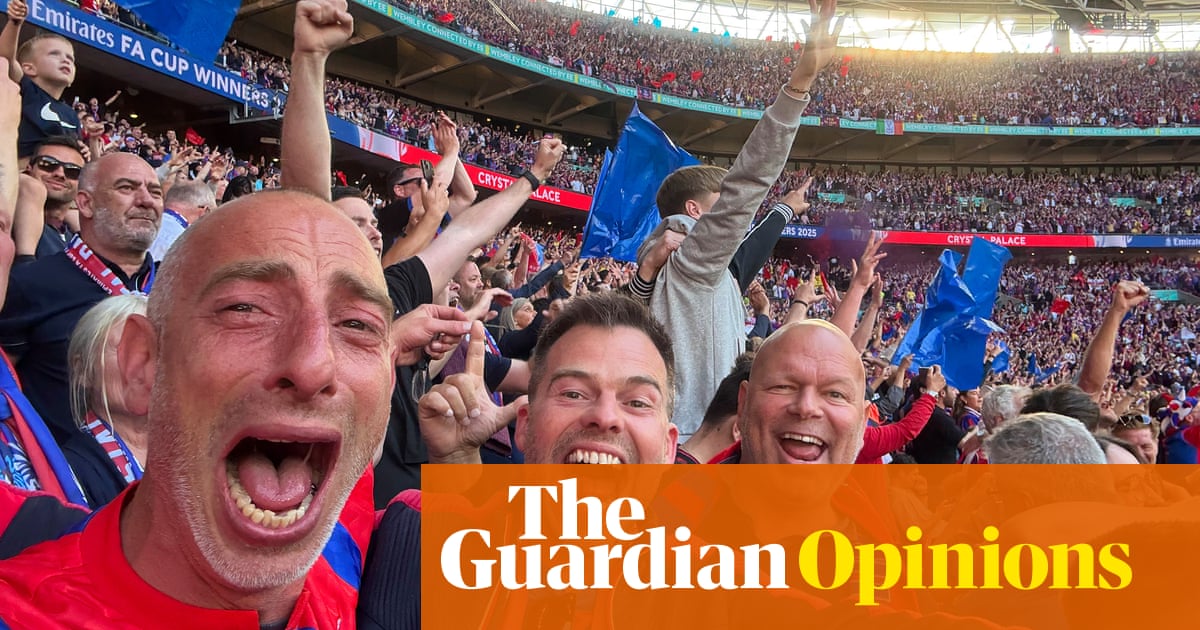When Marc Guéhi and Joel Ward went up to collect the FA Cup, we were there. Although it still seems like a dream. The sense of disbelief that Crystal Palace supporters feltwhen the full-time whistle at Wembley ended their wait to win a major trophywill probably take a few more days to fade away given it’s taken almost 120 years to become a reality. But with most of the 30,000 wearing red and blue having travelled from south London in hope rather than expectation, finally, it was our moment.
After an agonising 10 minutes of stoppage time that seemed to take an eternity, the emotions of defeat in Palace’s two previousFA Cupfinals came pouring out. Everywhere you looked there were grown men – including me and the former Guardian stalwart Dominic Fifield – moved to tears. The comedian Mark Steel just kept shaking his head, unable to comprehend what had just transpired. It even spread to the royal box, where chairman Steve Parish, who had been pictured with his head in his hands moments earlier, was greeted with a bear hug from Palace’s largest shareholder, John Textor.
The pair have not exactly seen eye to eye in recent months, with the American hoping to take full control of the club if he gets his way. Yet this was clearly no time for squabbling and Parish was visibly moved as he watched Ward take centre stage in the week that it was confirmed the club captain will be leaving after 13 years of loyal service. Watching him and Guéhi running across the pitch at Wembley hoisting the Cup above their heads is a memory that none of us will forget.
Parish first started watching Palace in the mid-1970s when Malcolm Allison changed our nickname from the Glaziers to the Eagles and the club’s colours to red and blue to mimic Barcelona. Reaching the semi-finals in 1976 as a Third Division club began a lifelong love affair with the FA Cup for the 59-year-old businessman from Forest Hill, who rescued Palace from administration in 2010. He deserves so much credit for the steady progress they have made in the intervening years as Selhurst Park has become one of the most famous grounds in the Premier League for its old-school atmosphere.
There were times during the wilderness years in the Championship before Parish took over when average attendances dipped below 16,000. But a new generation of supporters led by the Holmesdale Fanatics – established in 2005 – has provided the impetus for the team’s success on the pitch. That much was evident at Wembley, where a sea of red and blue flags accompanied a tifo behind the goal which recalled a famous image of two young Palace fans called Dominic and Nathan and their father, Mark, celebrating Darren Ambrose’s goal against Manchester United in a Carling Cup victory at Old Trafford in 2011. Mark died of cancer in 2017 but their sons were there to see their team make history.
As Guéhi had beautifully summarised in the pre-match buildup, it’s the sense of community that makes south London tick. “You go outside, there’s diversity,” said the England defender who grew up in Brockley. “Everyone getting along with each other. You feel that in the club and that’s a given. So that’s definitely very important. It’s really nice to have other south Londoners in the club. To have that little bit of representation for the club as well.”
While Dean Henderson may have been lucky to stay on the pitch to produce his man-of-the-match performance, it seemed like karma for Mark Clattenburg not allowing play to continue when Conor Wickham was through on goal in the 2016 final and all the other times we have been denied. If Eberechi Eze’s dance moves after the match were anything to go by then Palace’s players must have enjoyed their celebrations deep into the night, despite having to face Wolves on Tuesday.
Sign up toFootball Daily
Kick off your evenings with the Guardian's take on the world of football
after newsletter promotion
Most supporters remained in a state of exhausted exultation after the final whistle, eventually drifting back to south London. Talk has already excitedly turned to the prospect of a first bona fide European campaign, with entry to the Europa League being FA Cup winners guaranteed. Footnotes about the Intertoto Cup campaign of 1998 – two matches against Turkish club Samsunspor after they were the only club to apply – and the Zenith Data Systems Cup victory in 1991 can at last be put to bed.
Before then Palace fans can look forward to attending the club’s first official parade since being promoted to the First Division in 1969 for the first time in their history under former manager Bert Head. Only a handful of those who were at Wembley on Saturday will remember that, but Monday 27 May, a bank holiday, will be another opportunity to show appreciation for, as manager Oliver Glasner put it, giving us “a moment for life”.
